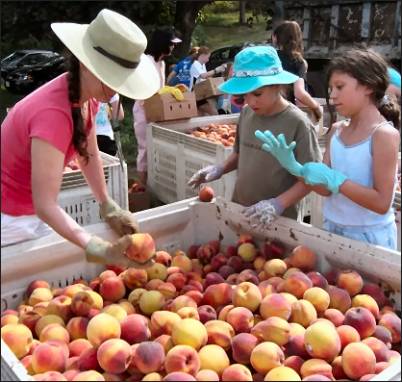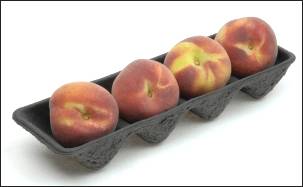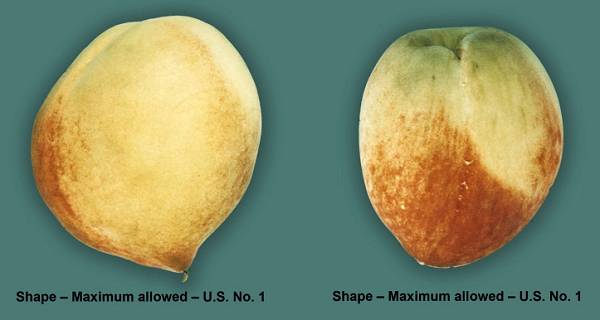By Lynette Johnson *

SoSA volunteers bagging peaches.
In my early 20s, I lived briefly in upstate South Carolina. Eagerly stopping at a roadside peach stand one summer day, I asked for a basket of peaches.
What I got was an education. “Ma’am, we have 22 varieties of peaches out today. You’ll need to tell us what kind you want.”
It’s peach season again, so I found myself dithering at a roadside stand in Virginia last weekend. Just three choices this time, though, all freestone. I chose a quarter-bushel of yellow peaches—sadly, I forgot to ask the variety.
It would have been a great time to ask all my questions, because shopping at a roadside stand gives you direct access to the farm and the farmer! It also gives you access to sizes and shapes of produce that you probably wouldn’t find in a grocery store.

Practically perfect peaches in a paper pulp tray.
Have you ever wondered how all the peaches at your supermarket fit into those clever recycled paper-pulp tray displays? How they grew so uniformly, just right for the space allotted to each?
Of course they didn’t grow that way! Supermarket peaches were harvested to meet USDA commodity standards, varying just 1/8” in size, with restrictions on color, shape, firmness, and blemishes. The trays were made, and the peaches picked, to meet the US No. 1 standard.

U.S. Number 1 Peaches
You might find the US No. 2s in an occasional store, probably in a bulk bin. But most of those will go to canneries. And the rest? Likely never harvested or graded out at the packing house, and left to rot!
What percentage of the harvest is actually lost? Check out this alarming chart from our friends at the NRDC:

What can YOU do about all that good food going uneaten?
- Shop at a farmers market or at a roadside or on-farm stand. Buy directly from the grower!
- Don’t be so picky in the grocery store. Every time you handle a piece of fruit, you are shortening its shelf life. If you pick it up and squeeze it, then you know it well enough to take it home!
- Eat what you buy. If you can’t eat it quickly enough, then freeze what’s left. The internet makes it easy to find freezing instructions that will preserve peak freshness.
- Volunteer with the Society of St. Andrew, and glean some of those peaches to share with hungry families in your community. Peaches are ripe and ready now, and we need your help! Visit endhunger.org/volunteer or give us a call at 800-333-4597 to get started.
* Lynette Johnson is SoSA’s Director of Church Relations.
AUG
2016

